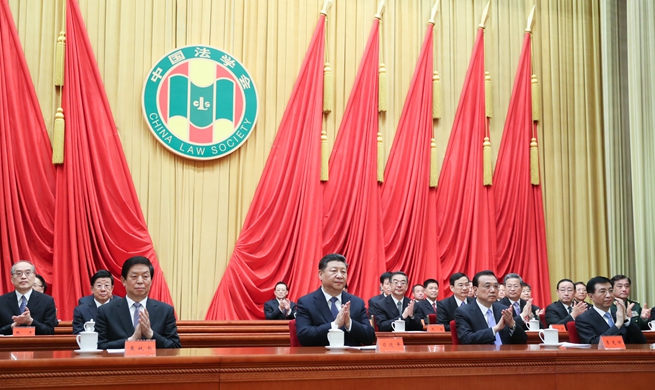WASHINGTON, March 19 (Xinhua) -- The White House predicted Tuesday that the U.S. economy will grow at an annual rate of 3 percent for 11 years, under the assumption that Congress fully approves President Donald Trump's economic agenda.
The Council of Economic Advisers (CEA), a presidential advisory body, said in its newly-released Economic Report of the President that its forecast is for real gross domestic product (GDP) "to grow at an average annual rate of 3.0 percent during the 11 years between 2018 and 2029."
However, in order for the forecast to become reality, the Republican White House will need approval from a divided Congress for more tax cuts, a large-scale infrastructure overhaul, continued deregulation for businesses, as well as a more stringent work requirements for working-age individuals who benefited from government aid programs, among other policies.
Tylor Goodspeed, who serves on the CEA, told reporters during a teleconference Tuesday morning that U.S. GDP growth in both 2017 and 2018 would have been lower than it actually was had it not been for the Tax Cuts and Jobs Act. Enacted at the end of 2017, the Republican-proposed legislation marked the country's most sweeping tax overhaul in three decades.
According to the budget proposal for fiscal year 2020 that Trump sent to Congress last week, the administration plans to extend the tax cut and make it permanent, an endeavor that is expected to face an uphill battle on Capitol Hill, especially in the House controlled by the Democrats who blamed the tax cut for expanding the federal budget deficit.
The deficit is 1.1 trillion dollars for fiscal year 2020, which covers Oct. 1, 2019 through Sept. 30, 2020.
The passage of an infrastructure bill in Congress, another hypothetical scenario purported by the CEA, is not guaranteed either. The report claimed that Congress will pass an infrastructure bill "commencing in 2019 with observable effects beginning in 2020."
Although there is bipartisan consensus on the need to improve infrastructure in the country, Republicans and Democrats remain at odds when it comes to designing the specific plan.
Regarding the tariffs that the Trump administration imposed on products worldwide over the course of last year, the report said they "raised the U.S. average applied tariff by 1.1 percentage points, from 1.5 percent in January 2018 to 2.6 percent in November 2018."
Although the federal government benefited from 14.4 billion dollars in revenue collected by those additional duties, costs paid by consumers in the form of higher prices and reduced consumption are offsetting those gains, the report said.













